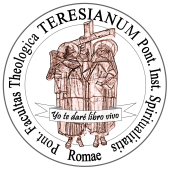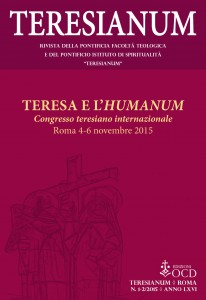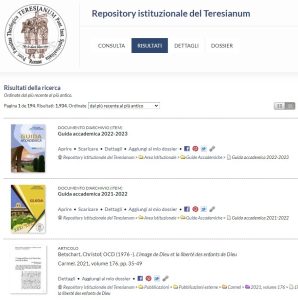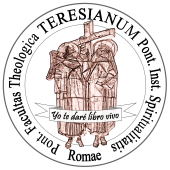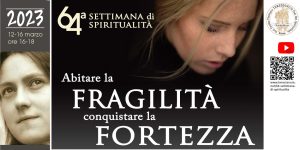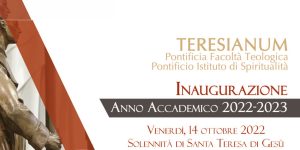Presentation
License cycle
1. The Cycle for the Licentiate in Theological Anthropology includes a biennium dedicated to the study of fundamental subjects and optional monographic courses, according to preferences, lines of specialization and seminars. It concludes with the De universa exam and the Dissertation of Licentiate. The entire plan of study consists of a minimum of 120 credits ECTS.
2. For the enrollment is required “the title of Baccalaureate in Theology or other equivalent title obtained in a Theological Faculty” (Statute, art. 76a) “with a grade not lower than the average of 8/10, 24/30 or equivalent, depending on the scale adopted. If the grade is lower, the Dean may require an entrance exam” (Statute, art. 46a) before two professors. Candidates who, despite having completed the Institutional Theology Cycle in ecclesiastically recognized institutions, do not possess the title of Baccalaureate, may enter the two-year specialization course on condition that they have attended an adequate program of studies, have a grade point average not lower than 8/10, 24/30 or equivalent, depending on the scale adopted (cf. Statute, art. 46b), and after an admission examination before two professors. If the result is negative, “they will have to attend one or more semesters of the first cycle, according to an established program, and then repeat the exam” (Statute, art. 46b).
3. At the end of ten years from the first enrollment as an ordinary student in the Licentiate Cycle, the right to continue studies expires.
4. In addition to Latin, Greek and Italian, the student must know one of these modern languages: English, French, Spanish and German (cf. Statute, art. 46d; 76b).
5. The outline of the Licentiate Dissertation, agreed upon with the Moderator, must be submitted to the General Secretariat by the day specified in the academic calendar, the first year of the Biennium. The project must contain: the theme of the Dissertation, the outline and the essential bibliography. It must not have been submitted to other Academic Centers.
The Moderator of the Dissertation of Licentiate is chosen by the Student among the Professors of the Faculty, while the Examiner is designated and appointed by the Executive Committee, chosen among the Professors of the Faculty. In special cases a Professor from other ecclesiastical or civil faculties may be appointed by the Executive Committee as Examiner.
Professors who have ceased to hold office (cf. Statute, Art. 41) normally cannot be Moderators. In addition, Emeriti may complete the office of Moderator received prior to being Emeritus. For Emeriti, the appointments of Moderator and Examiner are subject to the approval of the Grand Chancellor, upon proposal of the Faculty Council (cf. Statute, Art. 41b).
At the expiration of three years from the date of approval of the outline of the Dissertation of Licentiate you lose the right to continue the same research, unless the topic of the Dissertation remains free, that is, not approved in favor of another student.
The Licentiate Dissertation – from a minimum of 60 to a maximum of 120 pages – signed by the Moderator, will be delivered to the General Secretariat in 3 hard copies bound in cardboard (printed only on the front side), plus one copy in PDF format sent by email, within the date established in the Calendar of the academic year. At the same time it is necessary to submit the Declaration of originality of the text and the conformity of the PDF with the paper text, according to the model available on the Faculty website.
6. For the specialization in Theological Anthropology the color of the binding of the dissertation must be burgundy, while for the specialization in Spiritual Theology, blue.
7. For the presentation of the Dissertation of Licentiate and other written work should be borne in mind the general rules for the preparation of scientific work (available in Italian on the Faculty website).
8. As far as the exam De universa is concerned, it is possible to register for only three exams during the three years following the end of the course.
The Examination Committee for the exam De universa is made up of two professors who together question the candidate.
The exam De universa lasts one hour. The first ten minutes are dedicated to the presentation of the Dissertation of Licentiate by the candidate following a written plan that he/she must deliver to the Professors at the beginning of the examination, after which the Professors can formulate the relevant questions (ten minutes).
The written plan for the presentation of the Licentiate Dissertation must not exceed two pages and incorporate the following points:
- the student’s full name, title and subtitle of the dissertation;
- a brief summary of the dissertation (10-15 lines);
- the detailed plan for the oral presentation. It is welcomed to integrate quotations and the main results of the work (formulated in a concise manner) into this plan.
The Student brings three copies of this plan with him/her (one for his/her own presentation and two for the Professors). The final grade will also take this writing into account. During the remaining forty minutes of the exam, the Professors proceed to examine the candidate on the topics of the Thesis list.
The official language of the exam De universa is Italian; other languages may be used at the discretion of the Examining Committee.
9. The biennium ends with the conferral of the Licentiate Degree in Theology with specialization in Theological Anthropology (cf. Statute, art. 89c). For the aforementioned diploma the final mark is calculated as follows:
- 1/3 for the average achieved during the biennium;
- 1/3 for the written dissertation;
- 1/3 for the exam De universa.
Class schedule
From Monday to Friday 08.30-12.55. Some lessons can be held in the afternoon (15.30-18.50).
